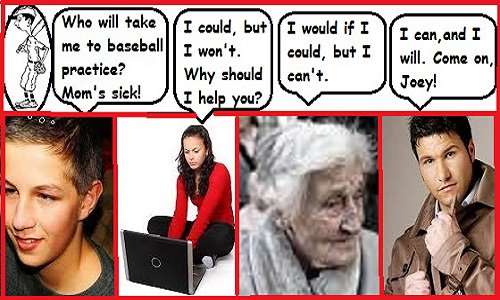How to Use Helping Verbs to Give Advice
Do you ever need to give advice? Using helping verbs well can help you suggest changes tactfully. That makes it easier for people to accept your advice.
Making suggestions to patients or coworkers is an important part of the job for many health care professionals.
Teachers & supervisors also need to know how to suggest improvements without provoking resistance.
In fact, almost anyone who works with others needs to know how to use helping verbs in English.
They can help you make suggestions in a gentle, positive way, without hurting feelings.
Read the basic tips below. Then go to Practice Giving Advice to choose the best such verbs to complete a sample conversation. (These examples all use health care situations. It should be easy to adapt them to other circumstances, though.)
Go directly to a particular section for examples or practice:
Helping Verbs Commonly Used for Giving Advice
Practice Giving Advice (link above-- a different page) has other ways to give advice. It also lets you practice using helping verbs in a nurse-patient conversation.
Helping Verbs Commonly Used for Advice
Here are some examples (with helping verbs in italics). They're followed by short explanations.
- “When you have a cold, you should drink lots of warm fluids and get plenty of rest.”
- “You really shouldn’t smoke. You don’t want to get lung cancer, do you?”
- “Should I call Dr. Black about that report he promised to send?”
- “I don’t think you should call him today. He has been yelling at all the interns. Maybe you could call tomorrow. He should be in a better mood by then.”
- “Do you think I need to see a specialist about the possible nerve damage?”
- “You should make an appointment with a neurologist, just to get a second opinion. He’ll tell you if you ought to get further treatments. You could ask him about the tingling in your fingers, as well.”
- “Mr. Jones, you must stop smoking immediately. If you don’t, you are headed for a massive stroke or heart attack in the near future.”
- “The hospital accreditation committee told the staff they must start signing the charting notes. Otherwise, the hospital will have to pay a huge fine and may lose its accreditation. They say it’s a safety issue, and we should remember that one more lawsuit could close the hospital.”
Explanations:
'Should' is the most common helping verb for suggesting what someone needs to do. (It has the same meaning as ‘ought to’—the idea that what has been suggested is best so the listener has good reason to do it.)
'Should' can also predict what's most likely or probable in the future. "He should be in a better mood by then" means the speaker expects Dr. Black to be more cooperative in the morning, but cannot promise it.
‘Could’ offers an idea for the listener to consider, but doesn’t ‘push’ it as the best.
‘Must’ means there are no options.
Grammar note: These verbs (should, ought to, could, and must, as well as would or will) do not change form the way most English verbs do. (They have no forms ending in –s, -ed, or –ing.)
They go before the main verb in a sentence. The main verb will also be in its infinitive form (without an –s, -ed, or –ing ending.) See the examples above.
For more information on the use of modals and other helping verbs, see English Verbs and Modal Verbs.
Giving Indirect Advice
There are times when direct advice is not appropriate. If you want to make a suggestion, but do not want to be pushy, you can turn your advice into a question. (This also works when you don’t have the authority to insist.)
As an alternative, use ‘could’ or ‘would’ instead of ‘should’ or ‘must.’
- “Do you think you could get an appointment with your cardiologist this week? The sooner you take care of this, the better.”
- “Does your wife know how to give you your injections? Maybe that would work better.”
- “Did you look into all the alternatives?”
- “Have you considered physical therapy?”
- “Has your mother tried Meals on Wheels? They deliver healthy, inexpensive dinners right to senior citizens’ homes.”
- “Are you willing to change your diet if it might mean you wouldn’t need surgery?
- “Is your son looking into options for long-term care?”
- “Are you going to check into alternatives to surgery?”
- “Are you finding the information you need, or would you like us to send you some?”
- “Could you tell me why you don’t want to take the medicine the doctor prescribed?”
- “Can your daughter help you follow these instructions?"
- “What about getting an MRI so we will have a better idea what’s wrong?”
- “If I were you, I would try that experimental treatment. You don’t have anything to lose.”
- “You would feel a lot better if you would resume your exercise program.”
- “Would you be willing to discuss this if you had more privacy? We could talk in my office down the hall.”
A brief grammar explanation:
Questions need a helping verb before the main verb in almost every case. Often the auxiliary verb will be ‘do’ (or ‘does’ or ‘did’), followed by a verb in the base or infinitive form.
For perfect tenses, use ‘have’ (or ‘has’ ’or had’) and then a past participle. (Perfect tenses let you speak about something that began in the past and is continuing),
If something is going on right now or planned for the future, you might use a continuous tense. Then the helping verb is ‘be’ (‘is,’ ‘are,’ ‘was, or ‘were’) and the main verb will be in its –ing form.
These three verbs ('do', 'have', and 'be'), unlike modals, DO change form.
If you would like more detailed explanations, see Question Formation, The Verb To Be, and Past and Present Perfect Tense Use.
Giving Negative Advice or Warnings
· “Don’t eat or drink anything after midnight. Your stomach needs to be empty for surgery. It’s a safety precaution.”
· “If you have a cold, don’t visit anyone in the hospital. It’s important to avoid introducing new germs to patients with low immunity.”
· “You must not stop taking this medication on your own. Call us right away if the side effects are bothering you and you want to discontinue it. We can arrange something else.”
· “Jim, you should never go from one patient’s room to another without changing gloves. We don’t want to spread an infection!”
· “You shouldn’t ever shout in the psych ward. Everyone’s nerves are on edge by the end of the day anyway.”
Remember to avoid double negatives in English. So, if you say ‘never,’ don’t also use ‘not.’ See Negative Sentences for a review of ways to make negative statements in English.
Practice Giving Advice continues this discussion. It gives ways to offer advice without using auxiliary verbs. Then there's a gap-fill exercise to practice different kinds of suggestions. Choose the appropriate helping verbs to complete the conversation between a discharge nurse and a patient.
Home> English Grammar> Using Helping Verbs to Give Advice.
Didn't find what you
needed? Explain what you want in the search box below.
(For example, cognates, past tense practice, or 'get along with.') Click to see the related pages on EnglishHints.
| site search by freefind | advanced |







